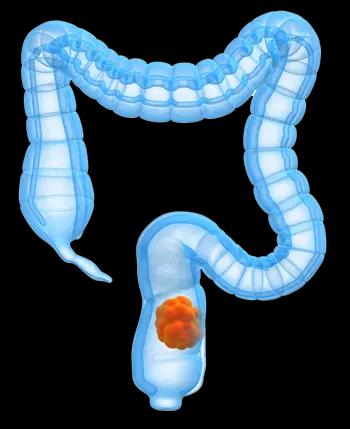
Colorectal cancer is a disease that develops in the colon or rectum, and is a significant public health concern, ranking as the third most common type of non-skin cancer in both men and women. While the good news is that the incidence of colorectal cancer is decreasing among older adults due to increased screening and changes in risk factors, the reality is that the rates are on the rise among younger individuals for reasons not yet fully understood.
In this guide, we will look into colorectal cancer screening, exploring the various testing options available, their pros and cons, and the crucial role they play in early detection and prevention. Whether you’re concerned about your risk or simply seeking to stay informed, this article will provide you with the knowledge and insights you need to make informed decisions about your healthcare.
Understanding colorectal cancer
Colorectal cancer, a complex disease that affects the digestive system, typically begins as abnormal growths or lesions in the lining of the colon or rectum. These lesions, known as polyps, can gradually turn into malignant tumours if left unchecked. The good news is that colorectal cancer is highly treatable, especially at an early stage, making regular screening a vital component of preventive healthcare.
Anatomy of the colon and rectum
The colon, also known as the large intestine, is a crucial part of the human digestive system, responsible for the final stages of waste processing and elimination. It is approximately 5 feet long and is divided into several sections, including the cecum, ascending colon, transverse colon, descending colon, and sigmoid colon. The rectum, the final 6-8 inches of the large intestine, connects the colon to the anus, the external opening through which waste is expelled from the body.
Risk factors for colorectal cancer
While colorectal cancer can affect individuals of any age, certain factors can increase an individual’s risk of developing the disease. These risk factors include:
- Older age (the majority of cases occur in adults aged 65 to 74)
- Family history of colorectal cancer or advanced polyps
- Personal history of inflammatory bowel diseases, such as ulcerative colitis or Crohn’s disease
- Inherited genetic conditions, such as Lynch syndrome or familial adenomatous polyposis
- Lifestyle factors, including physical inactivity, obesity, excessive alcohol consumption, and a diet high in processed and red meats
Screening tests for colorectal cancer
Screening for colorectal cancer is an important step in early detection and prevention. Several types of tests have been developed, each with its unique characteristics and considerations. Let’s explore the various options in detail.
Stool-based tests
Stool-based tests, also known as faecal tests, are a non-invasive approach to colorectal cancer screening. These tests analyse a sample of an individual’s stool for the presence of blood or DNA markers that may indicate the presence of polyps or cancer.
Fecal occult blood test (FOBT)
The Fecal Occult Blood Test (FOBT) is a screening method that checks for the presence of hidden (occult) blood in the stool. There are two types of FOBT:
- Guaiac FOBT (gFOBT): This test uses a chemical to detect the presence of blood in the stool sample
- Fecal Immunochemical Test (FIT): This test uses antibodies to detect the presence of haemoglobin, a protein found in red blood cells, in the stool sample
FOBT tests are typically performed annually and do not require extensive preparation or sedation. However, they may miss some polyps and cancers, and a positive result will often necessitate a follow-up colonoscopy.
Stool DNA test (FIT-DNA)
The Stool DNA Test, also known as FIT-DNA, is a more advanced stool-based screening method that looks for specific DNA changes in cells shed from the lining of the colon and rectum. This test can detect both blood and DNA markers associated with colorectal cancer and precancerous polyps.
FIT-DNA testing is generally recommended every 3 years and, like the FOBT, does not require extensive preparation or sedation. While it is more sensitive than the FIT test in detecting advanced lesions, it also has a higher rate of false-positive results, which can lead to unnecessary follow-up procedures.
Visual screening tests
Visual screening tests involve the direct examination of the colon and rectum using specialised medical devices. These further tests can provide a more comprehensive assessment of the digestive tract and allow for the removal of any suspicious growth during the procedure.
Colonoscopy
The colonoscopy is considered the gold standard of colorectal cancer screening. During this procedure, a long, flexible tube with a camera at the end (colonoscope) is inserted through the rectum and advanced into the entire colon. The doctor can visualise the lining of the colon and rectum, identify any abnormal growths, and remove polyps or collect tissue samples for further analysis.
Colonoscopies are typically recommended every 10 years for individuals at average risk, provided the results are normal. The procedure requires a thorough cleansing of the colon, known as bowel preparation, and is usually performed under sedation. While colonoscopy is considered safe, there is a small risk of complications, such as bleeding or perforation of part of the colon.
Flexible Sigmoidoscopy
Similar to a colonoscopy, a flexible sigmoidoscopy uses a slender, lighted tube to examine the rectum and the lower third of the colon. This procedure is less extensive than a colonoscopy, as it only evaluates a portion of the colon. However, it can still detect and remove polyps or abnormal growths in the examined area.
Flexible sigmoidoscopy is generally recommended every 5 to 10 years, often in combination with more frequent stool-based testing. The preparation required is less extensive than for a colonoscopy, and the procedure is typically performed without sedation.
Virtual Colonoscopy (CT Colonography)
Virtual colonoscopy, also known as computed tomographic (CT) colonography, is a non-invasive screening method that uses a series of X-ray images to create detailed, three-dimensional images of the colon and rectum. This procedure does not require the insertion of a scope, but it does involve the inflation of the colon with air or carbon dioxide to improve visibility.
Virtual colonoscopy is generally recommended every 5 years and, like the other visual screening tests, requires a thorough colon cleansing beforehand. While it avoids the need for sedation, any abnormalities detected during the virtual colonoscopy will typically require a follow-up traditional colonoscopy for further evaluation and potential treatment.
Choosing the right screening test
Selecting the appropriate colorectal cancer screening test can be a personal decision, influenced by various factors. When considering the options, it’s important to weigh the pros and cons of each test, as well as your individual preferences and risk factors.
Factors to consider
When choosing a colorectal cancer screening test, consider the following factors:
- Frequency: Some tests, like colonoscopy, may only need to be performed every 10 years, while others, like stool tests, may be required annually or every 3 years
- Preparation: Certain tests, such as colonoscopy and virtual colonoscopy, require extensive bowel preparation, which can be inconvenient and uncomfortable. Stool tests generally have less extensive preparation requirements
- Sedation: Colonoscopy typically involves sedation, while other tests, like flexible sigmoidoscopy, don’t
- Risks and complications: Invasive procedures like colonoscopy and flexible sigmoidoscopy carry a small risk of complications, such as bleeding or perforation of the colon
- Cost and insurance coverage: The cost of each screening test and the level of insurance coverage can also influence the decision
- Personal preferences: Some individuals may prefer the convenience of at-home stool-based tests, while others may feel more comfortable with a visual examination of the colon and rectum
Discussing options with your healthcare provider
Ultimately, the choice of colorectal cancer screening test should be made in consultation with your healthcare provider. They can help you assess your risk factors, discuss the pros and cons of each test, and recommend the most appropriate screening regimen for your specific needs and circumstances.
Remember, the goal of colorectal cancer screening is to detect the disease early, when it is most treatable, or to prevent it altogether by identifying and removing precancerous polyps. By working closely with your healthcare provider and making an informed decision about your screening, you can take an active role in safeguarding your long-term health and well-being.
Screening recommendations and guidelines
Recognising the importance of colorectal cancer screening, various medical organisations and expert panels have developed comprehensive guidelines to help healthcare providers and patients through the screening process.
Recommended screening age
The U.S. Preventive Services Task Force (USPSTF) and other leading medical organisations recommend that average-risk individuals begin colorectal cancer screening at age 45, a change from the previous recommendation of starting at age 50. This updated guidance reflects the concerning trend of increasing colorectal cancer incidence among younger adults.
Screening frequency
The recommended frequency of colorectal cancer screening varies depending on the specific test and an individual’s risk profile:
- Colonoscopy: Every 10 years for average-risk individuals
- Flexible sigmoidoscopy: Every 5 to 10 years, often in combination with more frequent stool-based testing
- Stool-based tests (FOBT, FIT, FIT-DNA): Annually or every 3 years, depending on the test
Individuals at increased risk, such as those with a family history of colorectal cancer or certain genetic conditions, may be advised to start screening earlier and undergo more frequent testing.
Screening for high-risk populations
Certain populations, such as those with inflammatory bowel diseases or a personal history of colorectal cancer or advanced polyps, are at a higher risk of developing the disease. These individuals may require more frequent or specialised screening, often including colonoscopy as the primary method.
Healthcare providers play a crucial role in assessing an individual’s risk factors and recommending the appropriate screening regimen. By following the established guidelines and working closely with their healthcare team, individuals can take proactive steps to safeguard their long-term health and well-being.
Conclusion
Colorectal cancer screening is a critical component of preventive healthcare, offering the potential to detect and even prevent this disease before it becomes life-threatening. By understanding the various screening tests, their benefits and limitations, and the recommended guidelines, individuals can make informed decisions about their healthcare and take proactive steps to safeguard their long-term well-being.
Sources
- Screening Tests to Detect Colorectal Cancer and Polyps – NCI
- Colorectal Cancer Screening – NCI
- Colon cancer screening: Weighing the options – Mayo Clinic
- Colorectal Cancer: What You Should Know About Screening – FDA
NowPatient has taken all reasonable steps to ensure that all material is factually accurate, complete, and current. However, the knowledge and experience of a qualified healthcare professional should always be sought after instead of using the information on this page. Before taking any drug, you should always speak to your doctor or another qualified healthcare provider.
The information provided here about medications is subject to change and is not meant to include all uses, precautions, warnings, directions, drug interactions, allergic reactions, or negative effects. The absence of warnings or other information for a particular medication does not imply that the medication or medication combination is appropriate for all patients or for all possible purposes.








